
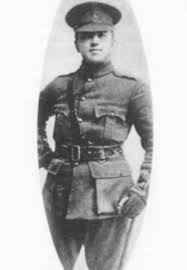
Indigenous Veterans Day is observed in Canada on November 8, in recognition of Indigenous contributions to military service, particularly in the First World War, Second World War and the Korean War. National Aboriginal Veterans Day was first observed in Winnipeg on November 8, 1994 and has since been observed nationwide.
Indigenous peoples have served in times of war and peace for more than 200 years since the War of 1812 to Afghanistan and many continue to serve. For many years, that service was often overlooked and underappreciated.
Learn more about Lieutenant Brant, Maxwell King, Tom Longboat and Mathew Solomon Mandawoub.
It is estimated that more than 7,000 Indigenous people served in the First and Second World Wars and the Korean War. Some estimates indicate that up to 12,000 may have served in the Canadian Forces in the past century.
Many Indigenous people also currently continue to serve in the Canadian Armed Forces in Canada and on operations around the world. They continue to uphold the proud legacy of service of past generations.
On Indigenous Veterans Day, the City honoured those brave individuals who served through the First and Second World Wars, the Korean War, peacekeeping missions around the world, and who continue to serve in the Canadian Armed Forces, in a ceremony that included traditional ways of honouring warriors from First Nations, Métis, Inuit, as well as non-status Indigenous veterans who served.
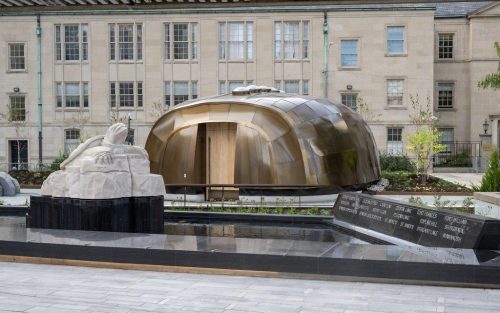
Led by Grandmother Vivian Recollet and in the presence of the Toronto Council Fire Eagle Staff, the ceremony took place at Toronto City Hall. Starting outdoors with a sacred fire to welcome the ancestors – the warriors that have gone before us – the ceremony continued with the sharing of stories about Canada’s Indigenous military history, and those who have served and continue to serve. It was an honour for the City to hold the sharing stories of remembrance in the new Spirit Garden’s Teaching Lodge. The Spirit Garden serves as a space for teaching, learning, sharing and healing.
Mayor Chow proclaimed November 8th as Indigenous Veterans Day, and on that day the Toronto Sign was lit the colours of the Medicine Wheel – red, white, yellow and black.
Indigenous Veterans Day
November 8, 2024
WHEREAS today, we acknowledge the military service and sacrifice of Indigenous Peoples. We honour those who paid the ultimate sacrifice for our peace and freedoms and recognize the ongoing military service of Indigenous Peoples in Canada including First Nations, Inuit, and Métis peoples.
Indigenous Peoples have a long history of military service that began during the War of 1812 when the small town, now known as Toronto, was defended by members of many First Nations. They have participated in every major military operation that Canada has been a part of including the First and Second World Wars, the Korean War, Canada’s mission in Afghanistan, as well as in peacekeeping operations.
Despite their willingness to serve, the realities of military service for Indigenous Peoples were challenging. While voluntary enlistment among Indigenous Peoples was high during the First and Second World Wars and the Korean War, many Indigenous men and boys enlisted in the military or cadet corps to escape cruel circumstances in residential schools. They faced alienation from their communities as they became disenfranchised after their service and no longer had Indian status when they returned home. Indigenous Peoples were also not always able to fully participate in Remembrance Day ceremonies in memory of their fallen ancestors.
More than 12,000 First Nations, Inuit and Métis peoples served to defend Canada in times of war and conflicts, natural disasters and in peace time. It is estimated that over 2,700 Indigenous Peoples currently serve in the Canadian Armed Forces. They have served with honour and distinction, bringing their unique culture and heritage to their work.
On Indigenous Veterans Day, the City of Toronto acknowledges with gratitude the continued legacy and valued contributions of Indigenous Veterans to the community, Canada, and around the world. We thank them for their courage and remember their sacrifices.
NOW THEREFORE, I, Mayor Olivia Chow, on behalf of Toronto City Council, do hereby proclaim November 8, 2024, as Indigenous Veterans Day in the City of Toronto.
Olivia Chow
Mayor of Toronto
The City of Toronto commemorated Indigenous Veterans Day on November 8, 2023 with the unveiling of two panels in the Hall of Memory at Toronto City Hall, to recognize the historic and ongoing participation of First Nations, Métis and Inuit who defend Canada, and defend peace around the world.
One panel documents those who stood to defend York on April 27, 1813 during the Battle of York. This panel now lists all the Treaty 13 and Williams Treaties partners who were present. On that day, the small town which became Toronto was defended by the Mississaugas of the Credit First Nation, Beausoleil First Nation, Georgina Island First Nation, and Rama First Nation.
A new panel features the symbol used by the Defence Indigenous Advisory Group, which represents the over 3,000 Indigenous personnel who serve in Canada’s military. It now has a permanent place in this Hall of Memory.
With these panels honouring Indigenous soldiers past and present, Toronto and its citizens honour the many contributions made by Indigenous peoples from across Canada in defence of this land.
The ceremony included the presence of Corporal Jason Nakugee of the Algonquin Regiment who is a member of the Mushkegowuk Territory of the Attawapiskat First Nation of Northern Ontario who carried the Frances Pegahmagabow Eagle Staff. The Eagle Staff is a symbol of unity among Indigenous women and men in the defence community. It is a marker of empowerment, pride to honour the Indigenous heritage of members of the Canadian Forces and Department of National Defence and invites us to keep close the legacy of the First Peoples. The ceremony began with a Sacred Fire ceremony to welcome and honour the spirits of those brave warriors that gave their lives, and also included a presentation at Toronto City Council.
The Hall of Memory was designed by the original architect of the building, Viljo Revell, to be a dignified and reflective space to commemorate the city’s military history. The Hall contains the crests and symbols of Toronto- based units that have served Canada from the 1800’s to the present day.
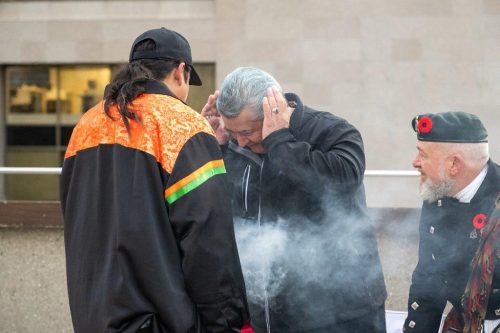
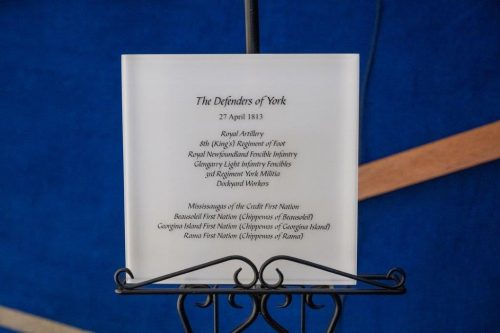
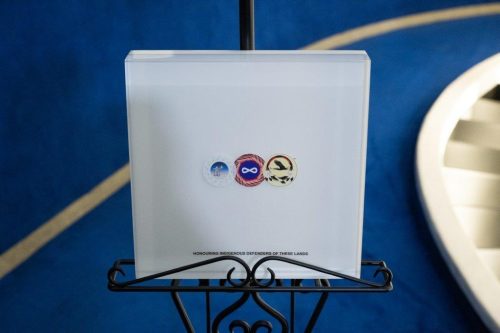
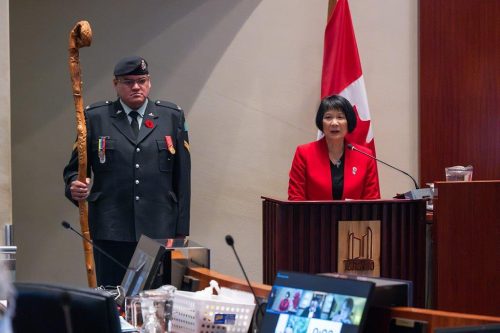
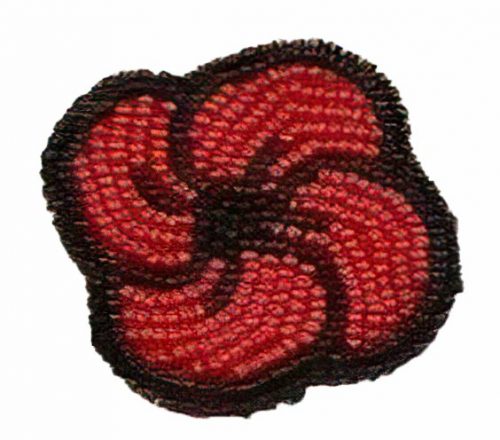
Beading is a highly developed skill in Indigenous communities. Mnidoomnensag, the Anishinaabemowin word for beads, means “small spirit berries”. Beading was a way of telling a story — intricate and detailed floral designs imbued with ancestral tradition.
Beaded poppies are a relatively new phenomenon, and until recently, were not widely available. These poppies are found on more and more lapels leading to Remembrance Day, as Indigenous and non-Indigenous people seek to honour the service and commemorate the sacrifices of Indigenous soldiers.
For many Indigenous craftspeople, creating beaded poppies is an important way to keep Indigenous heritage alive. Given that Indigenous people weren’t allowed to practice their culture and traditions, it is important for many to undertake beading today.
The handmade poppies — with beads and porcupine quills sewn onto smoked moose hide — commemorate Indigenous members of the military who served in the two world wars and in the Korean War and is very meaningful for Indigenous veterans.
Wearing a beaded poppy is about respect: lest we forget, the service and sacrifices of Indigenous and non-Indigenous soldiers, their shared values and their shared history. The beaded poppy is a source of pride and resilience. It is also an opportunity to have conversations about reconciliation. While beaded poppies honour all veterans, they draw attention to the unique plight of Indigenous people who went to war.
The Royal Canadian Legion has sold beaded poppies beaded by Indigenous artists. In 2022, they introduced a sealskin version made by an Inuk artist. Many local artists create beaded poppies and often direct a portion of the proceeds to veterans’ charities.
On the battlefields, Indigenous soldiers stood side-by-side their Canadian comrades, many serving with distinction. However, the Indigenous soldiers who came home often discovered their wartime contributions were quickly forgotten.
Equals on the battlefield, they couldn’t vote in Canada. In many cases, Indigenous veterans were unable to receive veterans’ benefits. For decades, they were forgotten soldiers.
While the federal government issued an apology in 2003 and compensated many, there are still many Indigenous veterans who have not received these entitlements or have fallen through the cracks.
Many Indigenous veterans were banned from Royal Canadian Legion halls where veterans gathered to socialize, and where they were also able to get advice on post-war benefits. Instead, Indigenous veterans were directed to agents, who didn’t always have their best interests in mind. Some had to give up their rights as status in order to serve.
Veterans Affairs Canada maintains a website with further information on the long and proud tradition of Indigenous military service to Canada which has not always been honoured and recognized.